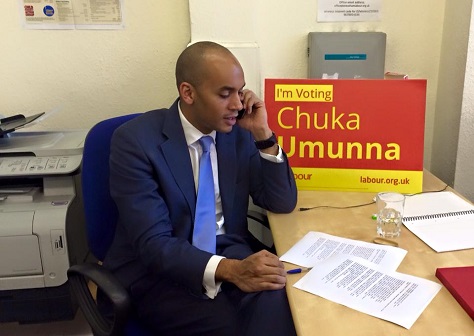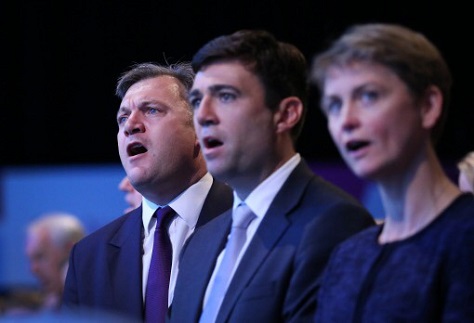 It was literally just three days ago that rising star Chuka Umunna entered the race to become the Labour Party’s next leader.
It was literally just three days ago that rising star Chuka Umunna entered the race to become the Labour Party’s next leader.
Citing concerns about the massive media intrusion into his life, Umunna abruptly withdrew from consideration earlier today:
However since the night of our defeat last week I have been subject to the added level of pressure that comes with being a leadership candidate. I have not found it to be a comfortable experience. One can imagine what running for leader can be like, understand its demands and the attention but nothing compares to actually doing it and the impact on the rest of one’s life.
It’s surprising that Umunna was so taken aback by the media’s role, especially after the punishing treatment to which Labour’s former leader, Ed Miliband, was subjected in over four years as British opposition leader.
No matter anyone says, Umunna will find it very difficult to make a leadership bid in the future after bottling the opportunity now — especially after oddsmakers made him the sudden frontrunner in the race to replace Miliband. Though Umunna started off his career as a Labour MP in 2010 with ties to the left wing of the party, he slowly moved to the center in his role as shadow business secretary, and he emerged as a favorite of New Labour figures, including former prime minister Tony Blair and former business secretary Peter Mandelson.
* * * * *
RELATED: The race to succeed Ed Miliband begins tonight
RELATED: What ‘New Labour’ can and cannot teach Labour in 2015
* * * * *
Though the chasm between centrist ‘modernizers’ and the more leftist wing of the party is narrower than the narrative of the past week of post-election post-mortems claim, Umunna was clearly capable of telescoping to Labour supporters and others that he would push, as leader, to bring the part back into the middle of British politics. As the son of a Nigerian father and a British-Irish mother, Umunna would have represented a growing class of British citizens with multi-racial backgrounds. He certainly has a compelling story and uniquely talented communications skills.
All of which means his withdrawal is bad news for Labour.
Even if you take Umunna at his word that the unexpected media glare forced him to step aside as putative frontrunner to lead Labour, it’s still incredibly odd. It’s natural to wonder whether there’s more to this story. A former DJ, Umunna received some negative publicity back in 2013 after he once posted on a website forum asking for recommendations for London nightclubs not ‘full of trash.’ It’s worth questioning if there are additional, more damning, revelations from Umunna’s past that could have made him less appealing. As a London native with a reputation as something of a slick operator, Umunna’s weakness was that he might have struggled to connect with working-class voters in the much poorer north. Similar revelations would have crippled Umunna’s ability to do so, potentially pushing traditional Labour voters to the eurosceptic, anti-immigrant United Kingdom Independence Party (UKIP), which placed second in many constituencies in northern England in the May 7 general election.
With decisions by veteran Dan Jarvis and former foreign secretary David Miliband not the pursue the leadership, two experienced candidates are now set to dominate the race — shadow health secretary Andy Burnham and shadow home secretary Yvette Cooper. Both have ministerial experience, and both have increased their standing while in opposition, Burnham by challenging moves by the Conservative Party to privatize certain elements of the National Health Service and Cooper by championing women’s rights. Nevertheless, both have ties to former prime minister Gordon Brown that have left moderates somewhat uncomfortable. Cooper’s husband, who shockingly lost his constituency last week, is former shadow chancellor Ed Balls (pictured above, left, with Burnham, center, and Cooper, right), a longtime economic adviser to Brown.
Umunna, moreover, represented a swift turn to the future generation of Labour that would bypass figures like Burham and Cooper. There are others who would like to claim that mantle, though none shine quite as brightly as Umunna.
Liz Kendall, shadow minister for care and older people, and a MP since 2010 (like Umunna), was the first person to declare her leadership candidacy. Like Umunna, her candidacy represents a clean break from the Blair-Brown and Miliband eras, and she has made it clear that she wants to reposition Labour in the center. Mary Creagh, shadow secretary for international development, an MP since 2005, also declared her candidacy yesterday.
Tristram Hunt (pictured above), the shadow education secretary, however, seems mostly likely to capitalize on Umunna’s withdrawal. At age 40, he is also a member of the 2010 class, and the shadow education secretary has a background as a historian and a journalist. But even if he’s elected leader, he’ll suffer from the contrast to Umunna — and second-guessing that he was only the second-most popular ‘modernizer’ in the race.
No more than six candidates can stand for leader, because each candidate needs the nominations of 35 MPs. That leaves room, conceivably, for a candidate of the hard left, possibly Jon Trickett or Ian Lavery. Nevertheless, unless Kendall or Creagh attract far greater support (and that’s a distinct possibility), it’s easy to imagine today that the contest will now come down to three major candidates: Burnham, Cooper and Hunt.
Burnham will now regain status as the early favorite, and he may well be able to ride that to the leadership as the most experienced candidate in the race. His challenge will be to reassure centrists that he’s not just a more charismatic version of Ed Miliband and that he can restore Labour’s appeal to middle-class voters in southern England, working-class voters in northern England and increasingly strident nationalists in Scotland.
On one hand, Burnham or Cooper could emerge as the favorite of the ‘experienced party elder’ set and then win against a divided ‘modernizer’ wing, split between Hunt and Kendall. On the other hand, it’s just as likely that Hunt will consolidate ‘New Labour’ supporters and leave the left divided among Burnham, Cooper and a potential hard-left candidate. With the contest now likely to run through September or even later, there’s plenty of time for a particular candidate to catch fire.

